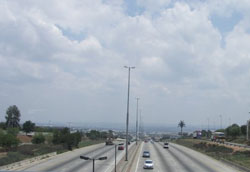Sanral says it has noted the rulings by the Advertising Standards Authority (ASA) regarding two of its ad campaigns, which have been described as misleading.
The South African National Roads Agency (Sanral) on Monday said it had taken note of the ASA rulings that uphold or partially uphold the complaints with regard to two of its advertisements.
Sanral said these advertising campaigns had run their course and would no longer be flighted.
"As Sanral, we are extremely aware of the scrutiny our advertising is exposed to and as a result, we continuously strive to provide information, which we believe is truthful and accurate.
"Sanral has no intention to mislead the public. We take note of all conditions of the law and will continue to comply," said Sanral head of communications Vusi Mona.
ASA found that Sanral could not prove that it had sold 1.2 e-toll tags and that it could not make such a claim in its advertisements.
Misunderstanding?
In setting the record straight, Sanral said figures around the e-tag sales were unaudited.
"In the past, the manner in which e-tag sales have been reported in the media has sensationalised the matter. Also, because the terminology used in the different questions was used interchangeably, some misunderstanding might have arisen," said the agency.
Sanral said the term "e-tag sales" does not refer to registrations - it merely refers to e-tags being sold, which might or might not include the tags "sold" by the key account holders, and/or e-tag sales at retail outlets.
"E-tags 'sold' does not mean it is necessarily registered on the e-toll system," Sanral reiterated.
It explained that key account holders are companies, e.g. banks and vehicle rental companies that have direct electronic integration on the e-toll system. They obtain e-tags from Sanral, and distribute e-tags to their vehicles or clients, which they then register on their own system and then upload the details in bulk onto the e-toll system.
The explanation...
Sanral said registrations do not just refer to vehicles fitted with e-tags. This can be any vehicle that has a registered e-toll account, with or without an e-tag, and might or might not include exempt vehicles.
"E-tags taken up", Sanral said, refers to e-tags registered on the e-toll system, and might or might not include e-tags taken up by key account holders, registered on their system, but not necessarily registered on the e-toll system, and might or might not include e-tags 'sold' at the retailers.
Sanral further said there were a number of factors that influence the sales figures of e-tags. These include:
• The feedback received from the key account holders and retailers on e-tags taken up, sold or registered;
• The selling of vehicles and the re-allocation of e-tags to new vehicles, through the key accounts;
• The registration of vehicles on the key account holder systems, but not on the e-toll account system;
• The selling of tags by retailers, but the non-linking of the e-tags to vehicles;
• The closing and re-opening of accounts, using the same or different e-tags and
• The registration of exempt vehicles.
"All of these factors lead to misunderstanding of the figures that Sanral reports on. The terminology used might be confusing to any person and our detractors used the reporting to question our honesty.
"In view of the ASA ruling, it would mean that all figures released by Sanral would need to be audited figures. However, e-tag figures will need to include auditing third parties' processes that do not fall within Sanral.
"The demand for the figures to be audited means Sanral can only release these once per annum after the Auditor General has audited the agency," said Mona.



























